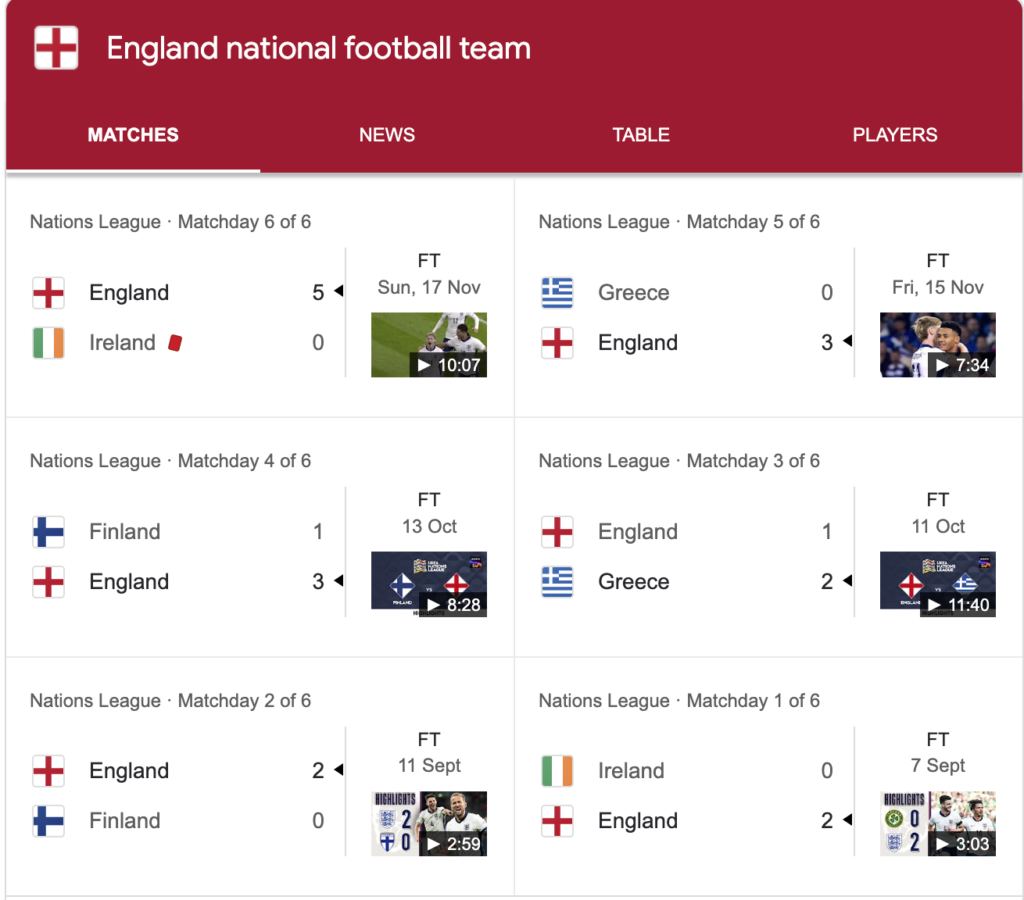England national football team is managed and administered by the Football Association and competes in major international tournaments like FIFA World Cup, UEFA European Championship and UEFA Nations League.
England currently have one of the best squads of players on Earth. Led by Harry Kane – widely considered the world’s best striker currently – other key players such as Jude Bellingham and Phil Foden are making headlines at their clubs.
In this article, we will discuss the main points or high lights of England National Football Team Games.
The team’s history
England is known for their long and distinguished football history both at home and abroad. Since 1966 when Wembley hosted its inaugural World Cup tournament, England have appeared in seventeen World Cup tournaments and ten UEFA European Championship tournaments (alternating every two years with FIFA World Cup ).
England have played 409 matches to date and been defeated just five times – an impressive record in World Cup matches: 102 wins, eight draws and just one loss! Their best performance in UEFA Championship competition came when they hosted both competitions (1968 and 1996 respectively).
At the conclusion of World War II, England rejoined the Football Association in 1946 but continued to be selected by committee until Alf Ramsey was named full-time manager in 1963. Under his management, England won their inaugural FIFA World Cup competition by defeating West Germany 4-2 after extra time; Geoff Hurst scored an astonishing hat-trick that sealed victory! They went on to finish third at 1972 Olympics but lost again against West Germany, losing two-legged semifinal against Franz Beckenbauer and Uwe Seeler who both scored against an England side missing Gordon Banks due to food poisoning!
After Ramsey left England management in 1974, Joe Mercer temporarily assumed control for seven matches before Don Revie was appointed his successor. Revie’s methods proved controversial: including demanding increased appearance fees from players and summoning excessive squads for training sessions. Furthermore, Revie used dossiers on opposing players while being criticised by his own players for failing to communicate with them effectively.
Revie’s successor Ron Greenwood made some changes that helped England improve performance at both World Cups, but both competitions ended without progress beyond group play. Under Greenwood’s direction they qualified for 1980 European Championship qualification but failed to advance beyond group stage competition. Viv Anderson became England’s first black player representing them and improved results – qualifying as first black team member! Ron led his side through qualifying, but could not make much impact at finals despite qualification and progress out of their group stage position.
After years of indecision under various managers, England finally won their first major trophy since 1966 at Euro 2020 when they reached the final against Italy – where their match ended 1-1 after regulation time but went to a penalty shootout to decide the victor.
Kits
The England national football team has an illustrious past. One of the world’s oldest and most recognizable teams, they are instantly recognisable thanks to their iconic jerseys. However, this year’s release has caused much discussion regarding national identity and kit design; specifically regarding Nike’s inclusion of a small cross which they term as an interpretation of St George’s flag on their new shirt design.
Crosses have long been used as a source of national pride among fans, whether as an emblem, shoulder detail, or stripe on sleeves. No matter its placement on clothing, however, the cross remains an integral symbol.
England is famously associated with white shirts, blue shorts, and either white or red socks – these have long been their traditional home kits. From time to time they may also sport an occasional third kit (once blue); in 1996 however they switched to an alternate grey away kit which proved less traditional but nonetheless popular among fans.
As England resumed international competition after World War II ended, players donned navy stockings during games against teams wearing red. Over time, however, the FA introduced standardised sets of flannel shirts and navy shorts when playing European opponents; additionally their crest featured ten Tudor roses representing each region within England.
England home and away kits for the 2024 UEFA Euro are now on sale, featuring stars from men’s, women’s, and para squads together in a launch photo. Nike’s Dri-Fit ADV innovation – developed to aid athlete performance – forms the basis for these kits; home jerseys feature purple hues which complement reds and blues of English flag.
The English national football team is overseen by the Football Association, an affiliation affiliated with UEFA that comes under FIFA’s global jurisdiction. England competes in three international tournaments contested by European nations: UEFA European Championship and Nations League. Although boasting a long list of legendary alumni, recent years have seen its performance decline considerably; current squad head Gareth Southgate hopes to take this summer’s Euros tournament as an opportunity to regain top form for England.
Managers
Thomas Tuchel’s selection as England national team manager represents a seismic shift in English football culture. Tuchel becomes the first foreign manager since 1966 to assume this post; this move shows the FA’s emphasis on tactical expertise over national identity. This controversial change has generated plenty of discussion from supporters and pundits, while many fans embrace it wholeheartedly.
Tuchel is an accomplished manager, having won league championships in both Germany and France. His expertise at managing at the highest levels of European competition was pivotal to their selection as England coach; it will likely reshape tactics while injecting high-pressing styles that may help break England’s longstanding international title drought.
After conducting a comprehensive search, the FA identified Tuchel as their preferred candidate to succeed Gareth Southgate as manager. A proven winner who has won league championships in both Germany and France, Tuchel’s appointment has sparked debate among supporters and pundits; most fans and analysts generally support it.
While several English managers such as Graham Potter and Eddie Howe were considered for this position, including Graham Potter and Eddie Howe, the FA decided on Tuchel due to his proven record coaching teams which challenged for trophies both domestically and abroad – meeting this criteria perfectly.
He led Chelsea to Champions League glory in 2021 and won one with Bayern Munich as well, making him a highly regarded coach who can handle the pressure and scrutiny associated with leading England into success. Fans are confident he is their man to lead them there.
Only four men have led England’s national football team to a major tournament final during their time as managers – Bobby Robson at the 1990 World Cup and Terry Venables at Euro 1996 among them – which includes Gareth Southgate who has been consistently impressive, while fans have high hopes for his successor; Thomas Tuchel’s appointment has caused much debate, as some fans voice discontent that an English coach wasn’t chosen as manager of England.
Songs about the team
England fans are famously famous for singing songs of support and national pride to show their loyalty towards their team, from Sven-Goran Eriksson’s legendary career in Sweden, or baked goods, there are endless songs fans can sing in order to demonstrate their support of Three Lions rugby team.
Three Lions (Football’s Coming Home), Vindaloo and Neil Diamond’s 1969 hit Sweet Caroline have all become iconic national anthems since England defeated Germany in Euro 2020’s semi-final match.
This anthem from Lightning Seeds and comedy duo Baddiel and Skinner remains one of the most beloved England football songs, capturing its spirit of support with an upbeat melody that captures supporter enthusiasm for their team with ease. However, unlike some anthems which celebrate England’s past glory without acknowledging England’s recent slip ups; instead it offers hope of their eventual revival through brilliant Britpop production combined with clever lyrics and an inspiring chorus to create this timeless classic.
Collapsed Lung’s Eat My Goal was recorded as part of Coca-Cola’s advertising campaign during Euro 96 tournament. Though not directly tied to any team, it remains catchy and easy to sing along to. Plus, it features special guest appearances by Spice Girls!
Kammy (also known as Kamaal Iqbal) attempts his hand at writing an England song with this 2012 release from Kammy Records. While not terrible, this version sounds more like a club singer trying to make jokes for drunk crowds rather than writing an engaging and memorable anthem for England fans in pubs during England matches than an original original track would do. Although not perfect it still serves its purpose well and should bring joyous cheer from England fans at games.


